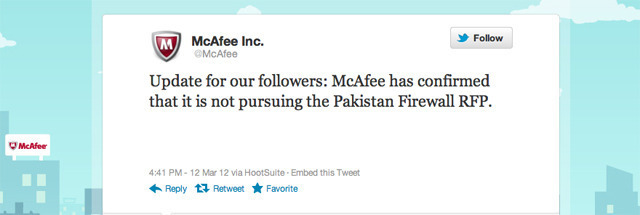
On Monday evening, McAfee became the fifth major IT vendor to pledge it won't bid on a Request for Proposals from the Pakistani government for adding enhanced censorship capabilities to Pakistan's Internet backbone. Four other major IT companies have also pledged not to submit bids, and more than 16,000 people have signed a petition urging other companies to follow suit.
As we reported last month, Pakistan currently censors a wide variety of websites, including content that is "obscene," "blasphemous," and potentially embarrassing to public officials. Right now, the blacklists are maintained manually by Pakistani telecom companies, and those firms are overwhelmed. The Pakistani government wants to build a more centralized and automated system.
But the project has proven controversial. A Pakistani advocacy group has described the proposal as "the coldblooded murder of the Internet in Pakistan."
Last week, Sandvine, Cisco, Verizon, and Websense all signaled that they would not bid to participate in the project—though some of them indicated their products wouldn't be a good choice for the job, anyway. The Global Network Initiative, an Internet freedom organization that counts Microsoft, Google, and Yahoo as members, has called for a boycott of the Pakistani project.
An advocacy group called Access has created a petition targeting other vendors of similar gear like Bluecoat, Huawei, McAfee, Netsweeper, and ZTE. When this story was written, the petition had about 17,000 signatures. McAfee has since stated it won't participate in the project. The other petition targets have not commented. Bids are due on Friday.
One of the firms that have pledged not to bid for the contract, Websense, issued a particularly strong statement of opposition. "We call on other technology providers to also do the right thing for the citizens of Pakistan and refuse to submit a proposal for this contract," the firm wrote in a March 2 statement. "Broad government censorship of citizen access to the internet is morally wrong."
Access spokesman Mike Rispoli told Ars that in addition to the petition targeting international IT firms, his group is working with local Pakistani groups to pressure the government to drop the project. "Pakistan claims to be a democracy," Rispoli said, but "implementing such a system clearly undermines democratic values."
Of course, even if the campaign convinces most Western companies not to bid on the contract, the Pakistani government will likely find someone to build its censorship system. (The explicit goal of the tender is "indigenous development" of the censorship system.) But Rebecca MacKinnon, a scholar and Internet freedom advocate at the New America Foundation, told Ars that this doesn't absolve companies of responsibility for their actions.
"'If we don't do it somebody with even fewer scruples will' is never a legitimate excuse for corporations to collaborate with government actions that will clearly result in the violation or restriction of citizens' universally recognized rights," she said. "Such excuses contribute to a global race to the bottom in both government and corporate behavior."
Listing image by Photograph by Mike Licht
reader comments
40